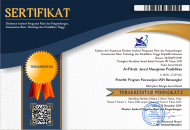Evaluation of Learning Programs in the Independent Curriculum in Elementary Schools
Abstract
This paper aims to describe the evaluation of learning programs in the independent curriculum in elementary schools. Types of field research research. Data collection techniques that the authors use are observations, interviews, and documentation. Furthermore, the data analysis technique that the authors use as a guide is the data analysis technique according to Miles and Huberman. The steps are from data collection, data reduction, data presentation to conclusions. The results of the study show that the learning program in the independent curriculum has not been implemented optimally. Because of the teacher's difficulties in developing learning tools, including, not being able to read CP (learning achievements) properly, not being able to compile TP (learning objectives) from existing CP (learning achievements), not being able to compile ATP (learning objectives flow) from TP, difficulty developing teaching modules, and independent curricula allowing them to be thematic. So that the results of formative and summative assessments are not in accordance with established standards.
Keywords
Full Text:
PDFReferences
Angga, A., Suryana, C., Nurwahidah, I., Hernawan, AH, & Prihantini, P. (2022). Comparison of the Implementation of the 2013 Curriculum and the Independent Curriculum at Elementary Schools in Garut Regency. Basicedu Journal , 6 (4), 5877–5889. https://doi.org/10.31004/basicdu.v6i4.3149
Anggraena, Y., Ginanto, D., Felicia, N., Andiarti, A., Herutami, I., Alhapip, L., … Mahardika, RL (2022). Learning Guide and Assessment of Early Childhood, Elementary, and Secondary Education . Jakarta: Agency for Standards, Curriculum and Education Assessment Ministry of Education, Culture, Research and Technology of the Republic of Indonesia.
As-Tsauri, MS, Rochman, C., & Maslani, M. (2021). The Challenges of Elementary School Teachers in Understanding the Achievements of the School Management Component. Al-Fikrah: Journal of Education Management , 9 (1), 55–64.
Daga, AT (2021). The Meaning of Independent Learning and Strengthening the Role of Teachers in Elementary Schools. Journal of Educatio FKIP UNMA , 7 (3), 1075–1090.
Firdaus, H., Laensadi, AM, Matvayodha, G., Siagian, FN, & Hasanah, IA (2022). Program Evaluation Analysis of the 2013 Curriculum and the Independent Curriculum. Journal of Education and Counseling (JPDK) , 4 (4), 686–692.
Ginaya, G., Kanca, IN, Astuti, S., & Nyoman, N. (2020). Designing problem-based learning (PBL) model for tourism vocational education in 4. o industry. International Journal of Linguistics, Literature and Culture , 6 (1), 14–23.
Hartono, J. (2018). Data Collection Methods and Analysis Techniques . Yogyakarta: Cv Andi Offset.
Ineu, S., Teni, M., Yadi, H., Asep, HH, & Prihantini. (2022). Analysis of the Implementation of the Independent Learning Curriculum in Driving Schools. Basicedu Journal , 6 (5), 8248–8258.
Decree of the Minister of Religion of the Republic of Indonesia Number 347. (2022). Guidelines for Implementation of the Independent Curriculum in Madrasas . Jakarta: Directorate General of Islamic Education Ministry of Religion of the Republic of Indonesia.
Krissandi, ADS, & Rusmawan, R. (2015). Obstacles to elementary school teachers in implementing the 2013 Curriculum. Journal of Horizon Education , 34 (3).
Maladerita, W., Septiana, VW, Gistituati, N., & Betri, A. (2021). The Role of the Teacher in Implementing the 2013 Curriculum in Elementary Schools. Educative: Journal of Educational Sciences , 3 (6), 4771–4776.
Manalu, JB, Sitohang, P., & Henrika, NH (2022). Development of Free Learning Curriculum Learning Devices. Proceedings of Basic Education , 1 (1), 80–86.
Maulida, U. (2022). Development of Independent Curriculum-Based Teaching Modules. Tarbawi: Journal of Islamic Thought and Education , 5 (2), 130–138.
Nasution, SW (2022). Independent Learning Curriculum Assessment in Elementary Schools. Proceedings of Basic Education , 1 (1), 135–142.
Nurcahyo, L. (2020). The Independent Learning concept approach in learning Fine Arts in the industrial era 4.0. National Seminar on Art and Design 2020 , 143–150. State University of Surabaya.
Purnawanto, AT (2022). Meaningful Learning Planning and Independent Curriculum Assessment. Journal of Pedagogy , 15 (1), 75–94.
Rindayati, E., Putri, CAD, & Damariswara, R. (2022). Difficulties of Prospective Educators in Developing Learning Devices in the Independent Curriculum. PTK: Journal of Class Action , 3 (1), 18–27.
Saleh, M. (2020). Freedom to learn in the midst of the Covid-19 pandemic. Proceedings of the National National Education Seminar , 1 , 51–56.
Sugiyono. (2018). Quantitative Research Methods, Qualitative, and R&D . Bandung: Alphabet.
Wahyuni, ES, & Yokhebed, Y. (2019). Description of learning media used by biology teachers in public high schools in Pontianak City. Journal of Informatics and Science Education , 8 (1), 32–40.
Yusuf, M. (2017). Quantitative Research Methods, Qualitative & Combined Research (4th ed.). Jakarta: Kencana.
DOI: http://dx.doi.org/10.31958/jaf.v10i2.7842
Refbacks
- There are currently no refbacks.
Copyright (c) 2022 anis maha tika

This work is licensed under a Creative Commons Attribution-NonCommercial 4.0 International License.
__________________________________________________________________________
 | Al-Fikrah: The Journal of Educational Management |
Creations are disseminated below Lisensi Creative Commons Atribusi-NonKomersial 4.0 Internasional.













